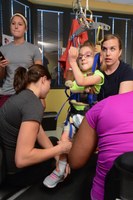UofL pediatric spinal cord injury research program garners significant support
 At three months of age, Emmalie Smith suffered a spinal cord injury leaving her paralyzed. Her parents, Amy and Bryce, took her to traditional physical and occupational therapy three times a week with the hope that their little girl would regain her ability to move.
At three months of age, Emmalie Smith suffered a spinal cord injury leaving her paralyzed. Her parents, Amy and Bryce, took her to traditional physical and occupational therapy three times a week with the hope that their little girl would regain her ability to move.
Amy says the results were underwhelming, with Emmalie using her forehead to activate a motorized wheelchair.
Unsatisfied with that as an option, Amy contacted the University of Louisville and Andrea Behrman, Ph.D., who had brought to UofL her research into the use of Locomotor Training to provide better rehabilitation to children with paralysis from spinal cord injuries.
Nine months after the intense physical therapy at the Frazier Rehab Institute, a part of KentuckyOne Health, Emmalie was able to better move her arms, roll over and come to sit in bed, and use a manual wheelchair. After her most recent work with Behrman and the pediatric team, the now 4-year-old from Brighton, Mich., is beginning to stand. With an injury at such a very young age, these are new experiences in Emmalie’s growth and development.
“This has made a tremendous difference in Emmalie’s life,” Amy said. “Her core strength is to where she is able to sit on her own and doesn’t need a chest belt. She’s able to get herself around and is much more independent. Working with Dr. Behrman and her team has had a huge impact on Emmalie and our entire family.”
More children like Emmalie will be able to benefit from Behrman’s groundbreaking efforts, thanks to a three-year, $1.5 million grant provided by The Leona M. and Harry B. Helmsley Charitable Trust.
“The work of Dr. Behrman and her team is a perfect example of the goal of every researcher at the UofL Health Sciences Center -- transforming peoples’ lives through creating and translating into actions new knowledge about how to prevent, treat and cure medical issues,” said James R. Ramsey, Ph.D., president of the University of Louisville, in announcing the grant at a news conference today (Sept. 4). “We are very excited and grateful that the Helmsley Charitable Trust shares our vision and is providing significant support to help us achieve this ambitious objective.”
To date, the Helmsley Charitable Trust has provided nearly $16.5 million to support UofL researchers investigating both cancer prevention and cures and rehabilitation efforts for adults and children who are paralyzed.
“Dr. Behrman’s work has the potential to be truly transformative for adults and children who are affected by paralysis -- not just in Louisville and Kentucky, but around the world.” said John Codey, a trustee of the Helmsley Charitable Trust. “With this latest grant that is focused on treating pediatric spinal cord injuries, the Trust is thrilled to build upon our relationship with UofL’s world-class team of researchers, who continue to break new ground in the quest to understand and solve some of the most critical medical challenges that we face today.”
“The importance of support from our partners cannot be over-emphasized,” said David L. Dunn, M.D., Ph.D., UofL executive vice president for health affairs. “The current research funding environment does not guarantee that projects like Dr. Behrman’s will receive support from the typical funding agencies. We are extremely grateful that the Helmsley Charitable Trust recognizes that the work taking place at the University of Louisville has the significant potential to change the lives of children throughout the world.”
Behrman, professor of neurosurgery and director of the UofL Kosair Charities Center for Pediatric Neurorecovery, is a pioneer in the use of Locomotor Training in children. The intense physical therapy regime was developed by Behrman and fellow UofL faculty member Susan J. Harkema, Ph.D., professor of neurological surgery and the Owsley B. Frazier Chair in Neurological Rehabilitation at UofL and the Rehabilitation Research Director of the UofL Kentucky Spinal Cord Injury Research Center.
Locomotor Training allows individuals with certain kinds of spinal cord injuries to repetitively practice standing and stepping using body weight support and a treadmill with manual facilitation from therapists and technicians. The ultimate goal is to re-train patients with spinal cord injuries to sit independently, stand and walk again. Further benefits including improved respiration, bladder control, and sensation have made a significant impact on the quality of life for children. Behrman’s goal is to help children who not only have spinal cord injuries, but also conditions such as head trauma and tumors.
“The generous support we are receiving from the Helmsley Charitable Trust will enable our team to develop equipment that better fits children as they participate in Locomotor Training,” Behrman said. “Also, we now will be able to develop a systematic database for immediate and long-term outcomes for the children who are participating in our program. We also will gain a better understanding of the value of sensory cues such as surface texture, heat/cold or vibrations and their potential impact on the child’s rehabilitation effort.”
 Facebook
Facebook Twitter
Twitter Linkedin
Linkedin